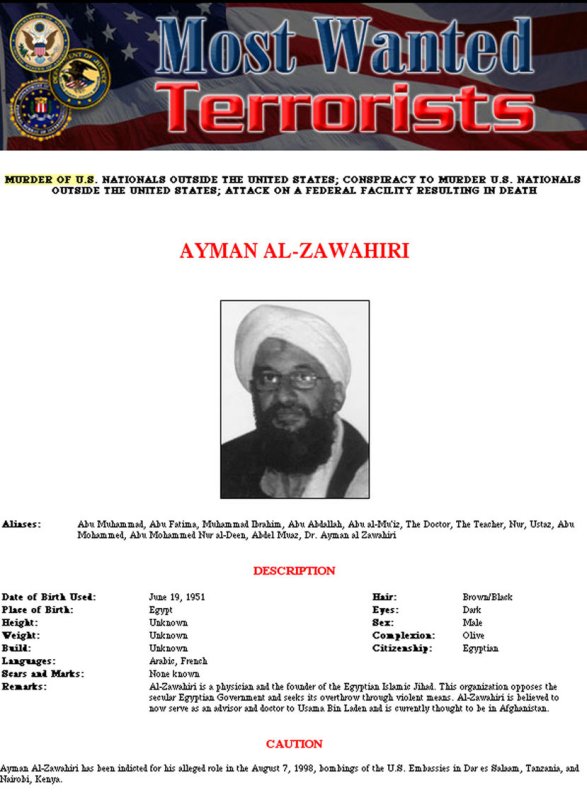Most Wanted Terrorist poster of Ayman Al-Zawahiri released by the FBI. cc/cc/FBI UPI |
License Photo
BEIRUT, Lebanon, Sept. 7 (UPI) -- In recent weeks, the United States and Pakistan claim to have killed or captured several top al-Qaida operatives, despite the outcry in Pakistan over the U.S. assassination of Osama bin Laden.
These actions primarily involve the CIA and the U.S. military's Joint Special Operations Command. They're part of an escalating effort by U.S. President Barack Obama's administration to eliminate bin Laden's Egyptian successor, Ayman al-Zawahiri, and his lieutenants.
U.S. officials have been boasting for weeks that the al-Qaida central leadership centered in Pakistan is in disarray after losing a string of key figures following the May 2 killing of bin Laden by U.S. Navy SEALs in his Pakistan hideaway.
Among them were Mohammed Ilyas Kashmiri, one of al-Qaida's most dangerous commanders and strategists, who was reported killed in a June 3 U.S. drone strike in South Waziristan.
Atiyah Abdel Rahman, al-Qaida's second-in-command, was reported killed in a missile strike Aug. 22 by a U.S. unmanned aerial vehicle in North Waziristan.
On Monday, The Pakistani military announced the capture several days earlier of Younis al-Mauritania in Quetta in the badlands of southwestern Pakistan near the Afghan border and long considered a jihadist safe haven.
Mauritania was in charge of al-Qaida's international operations and had been tasked by bin Laden to plan attacks on key economic targets in the United States, Europe and Australia.
The reported deaths of Kashmiri and Abdel Rahman haven't been confirmed either by the United States or Pakistan.
The authenticity of a purported Islamist communique verifying Kashmiri's demise has been questioned, on the grounds the Kashmir-born veteran, who headed al-Qaida's so-called Shadow Army, may have faked his own death to throw off his pursuers.
However, officials said July 7 that U.S. agencies had "confirmed to their satisfaction that Kashmiri is dead."
Reports by authorities in Pakistan, Yemen and other combat zones of jihadist leaders being killed have frequently proved to be wrong. Some chieftains have been reported killed two or three times but are still operating.
Despite the friction with Pakistani security chiefs caused by the bin Laden assassination and punishing attacks by missile-armed drones, the Pakistanis appear to have decided to improve cooperation with U.S. forces -- as the capture of Mauritania indicates.
It's not clear what brought about the change of heart. But in late June, senior U.S. officials gave Pakistani intelligence a kill-or-capture list of more than two dozen al-Qaida leaders and their allies, including Mauritania.
All the targets are reported to be in Pakistan, Yemen, Somalia and North Africa.
Topping the list is Zawahiri, who had been bin Laden's deputy since they formed al-Qaida in 1996; and Saif al-Adel, another Egyptian considered the group's operational commander for Pakistan and Afghanistan.
Others included Jalaluddin Haqqani, an Afghan warlord who commands a militant Islamist network closely allied to al-Qaida; and his son Sirajuddin, the network's operational chief.
Al-Qaida's spiritual leader, Abu Hafs al-Mauritania; Saudi-born Adnan al-Shukrijuma, the group's operational commander for North America; Abu Yahya al-Libi, a Libyan who's the operational commander in Afghanistan, and two of bin Laden's sons, Saad and Hamza, are also targeted.
So are three U.S. jihadis, all converts to Islam, named as Abu Ibrahim al-Amriki, Saifullah al-Amriki and Anwar al-Amriki.
Amid the euphoria in U.S. circles that al-Qaida is on the ropes, or soon will be, many analysts and commentators have said Zawahiri is too abrasive, dictatorial and too focused on the Arab world to hold al-Qaida together following the death of the charismatic bin Laden.
But Michael Scheuer, a 22-year CIA veteran who ran Alec Station, the agency's unit tasked with hunting bin laden in 1996-99, says Zawahiri "may never be bin Laden but there is zero evidence that he is a reckless, supremely egotistical fool bent on self- and organizational immolation."
Zawahiri, he observed, "is pious, talented, personally brave and -- like bin Laden -- not only ruthless but blessed with an uncanny knack for surviving against very long odds …
"Having inherited a sound and expanding organization … prudently managed, Zawahiri's assets are more than sufficient to keep al-Qaida in a position to help feckless U.S. politicians promote America's financial ruin for decades to come. And worse." Scheuer noted.





